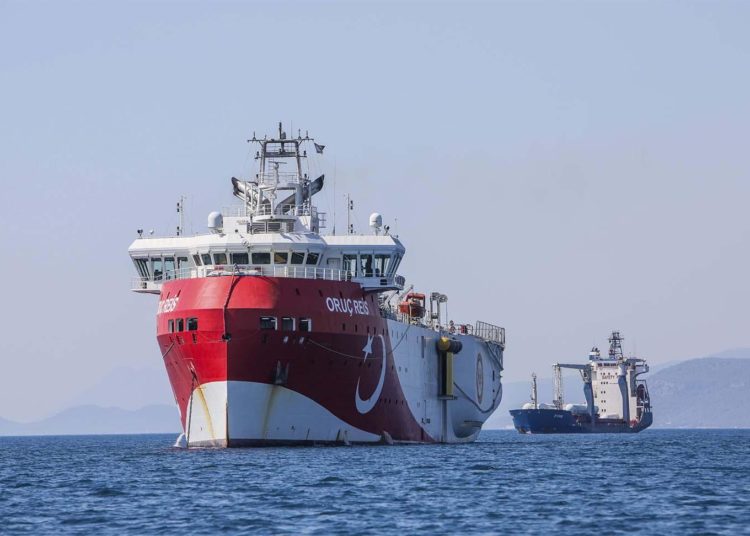Nordic Monitor
In an official statement, US State Department Spokesperson Morgan Ortagus said the US deplores what it considers to be the Turkish government’s “calculated provocation” in the eastern Mediterranean.
On Sunday Turkey issued a new Navtex for the Oruç Reis seismic exploration vessel to carry out activities south of Kastellorizo (Meis), a Greek island located two kilometers off Turkey’s southern coast near the resort town of Kaş, until October 22. The vessel will carry out seismic studies in the eastern Mediterranean together with two other vessels, the Ataman and the Cengiz Han.
Turkey’s move came a day after Egyptian President Abdel Fattah al-Sisi’s ratification of a joint Egypt-Greece maritime demarcation agreement to establish an exclusive economic zone (EEZ).
The strongly worded statement revealed the US stance against the Turkish government’s maneuvers in the eastern Mediterranean while defining Turkey’s unilateral action as a “calculated provocation.” The US statement responding to Turkey’s seismic exploration plans also exposes how the US views the Turkish government’s militarized foreign policy moves in its region and beyond.
“Coercion, threats, intimidation, and military activity will not resolve tensions in the Eastern Mediterranean. We urge Turkey to end this calculated provocation and immediately begin exploratory talks with Greece. Unilateral actions cannot build trust and will not produce enduring solutions,” the statement said.
“The United States deplores Turkey’s October 11 announcement of renewed Turkish survey activity in areas over which Greece asserts jurisdiction in the Eastern Mediterranean,” it said, adding, “Turkey’s announcement unilaterally raises tensions in the region and deliberately complicates the resumption of crucial exploratory talks between our NATO Allies Greece and Turkey.”
In July Turkey temporarily suspended its research plans for oil and gas exploration in the region following a German diplomatic initiative and a move by the US military. US and Greek forces conducted a joint naval exercise with the participation of elements of the US 6th Fleet in the last week of July.

On July 21 Turkey issued a Navigational Telex (NAVTEX 977/20) for its search for oil and gas to the south and east of Kastellorizo (Meis). A day later, another Navtex was issued by Greece in response to the advisory published by Turkey’s navy.
As the tensions were rising, German Chancellor Angela Merkel intervened by holding phone calls with President Recep Tayyip Erdoğan and Greek Prime Minister Kyriakos Mitsotakis to prevent a possible military confrontation.
Then, the US Dwight D. Eisenhower (IKE) Carrier Strike Group (CSG) took part in naval surface exercises with the Hellenic Navy in the eastern Mediterranean from July 24 to 28. The CSG conducts operations in the US 6th Fleet area of operations in Europe and Africa.

Following Turkey’s announcement, German Foreign Minister Heiko Maas called off a visit to Ankara to demonstrate his country’s solidarity with Cyprus and Greece. Maas was planning a three-stop trip including Turkey, Greece and Cyprus.
“My decision only to travel to Nicosia and Athens today is owing to the current developments that we have been talking about,” Maas said on Tuesday, according to Deutsche Welle.
“We appeal to Turkey to refrain from closing the dialogue window that has just opened with Greece through unilateral measures,” he stressed and warned that the renewed Turkish gas explorations “would be a severe setback for efforts to de-escalate and thus for the further development of EU-Turkey relations.”

President al-Sisi on Saturday issued a decree approving the maritime deal between Egypt and Greece. Presidential decree (No 444) “was based on the desire of the two countries to contribute to the stability of the region, in good faith, in accordance with international law as well as their desire in enhancing mutual cooperation, neighborly relations and bonds of friendship.”
Egypt’s official gazette published the text of the agreement, which stipulates that in the event natural resources, including hydrocarbon stocks, are found to extend from one party’s exclusive economic zone to the exclusive economic zone of the other, both sides must cooperate in reaching an exploitation agreement for these resources, Gulf News reported.

The US and German interventions in the crisis have triggered a new dialogue between Turkey and Greece under the NATO umbrella. Two weeks ago NATO hosted a series of technical talks between Turkish and Greek military delegations, which resulted in an agreement on “a bilateral military deconfliction mechanism.” The agreement also included establishing a hotline for use by senior officials from both countries to prevent a military confrontation over the dispute.
During a visit to Ankara on October 5, NATO Secretary-General Jens Stoltenberg said: “The de-confliction mechanism can help to create the space for diplomatic efforts. It is my firm hope that the underlying disputes can now be addressed purely through negotiations, in the spirit of Allied solidarity and international law.”
Ongoing tensions between Greece and Turkey in a territorial dispute over offshore gas and oil claims in the eastern Mediterranean were further exacerbated after Turkey signed a maritime demarcation deal with Tripoli’s Government of National Accord (GNA) in November, 2019, aiming to give Turkey extended access for hydrocarbon drilling rights in the region.
Turkey and Greece, both NATO members, claim the right to drill in the same areas in the same part of the eastern Mediterranean.












